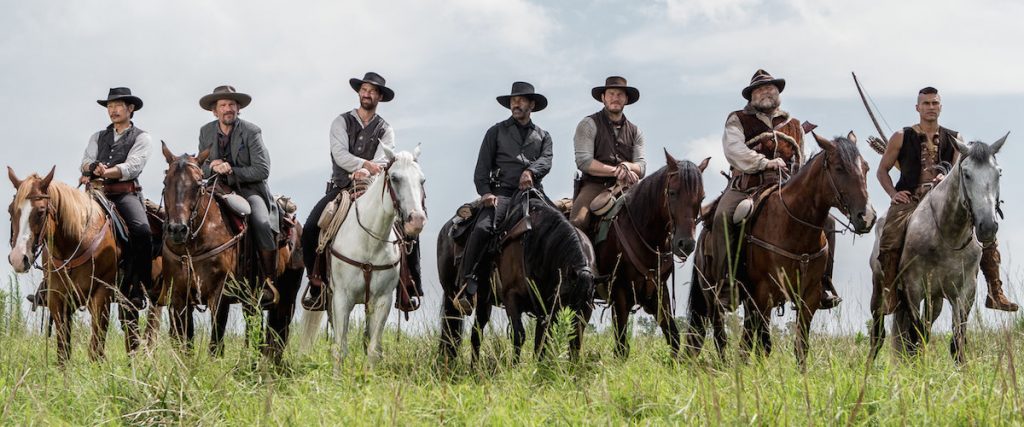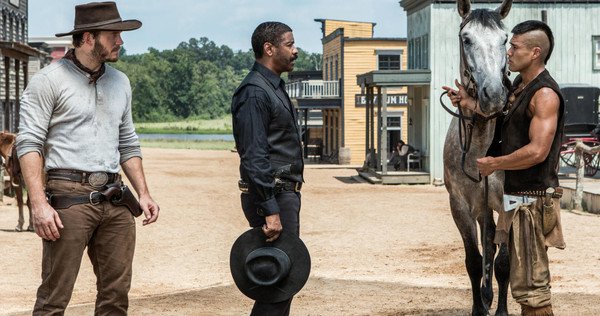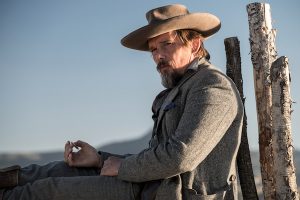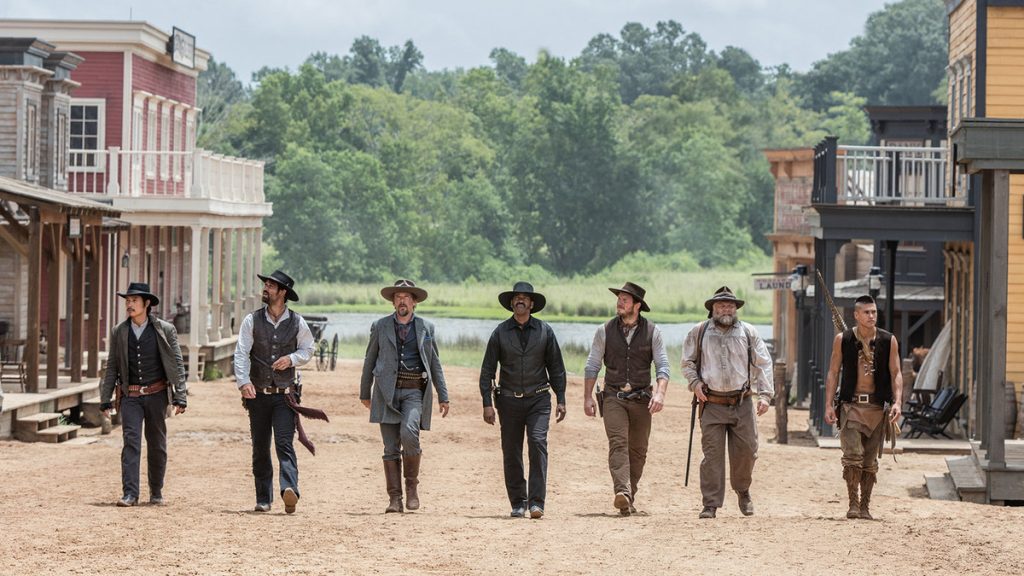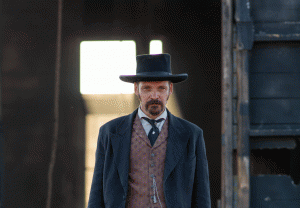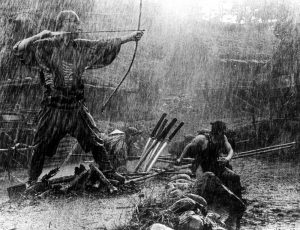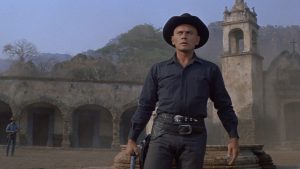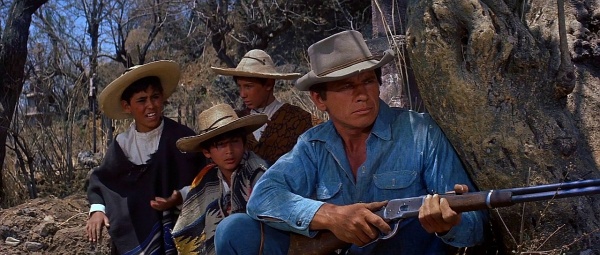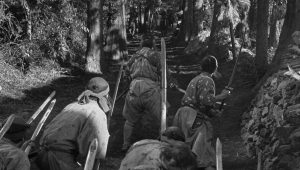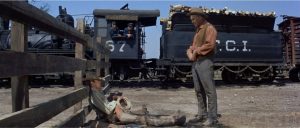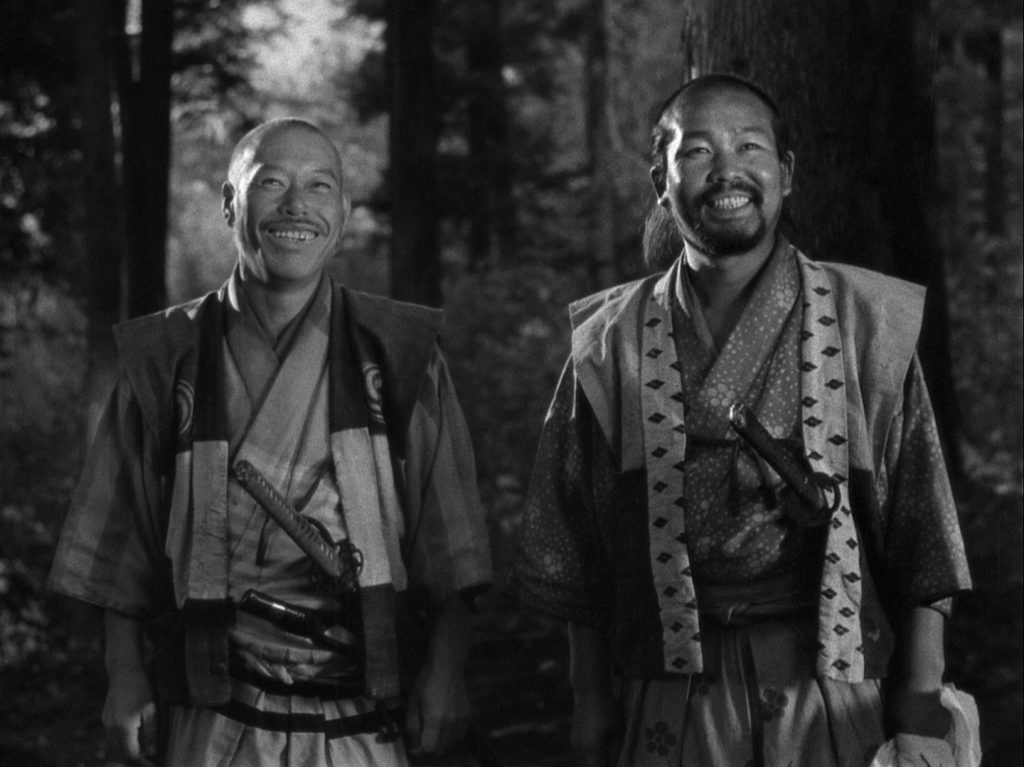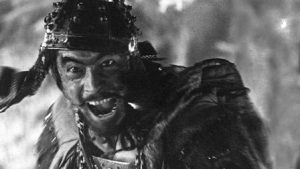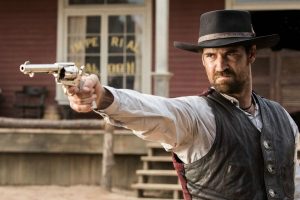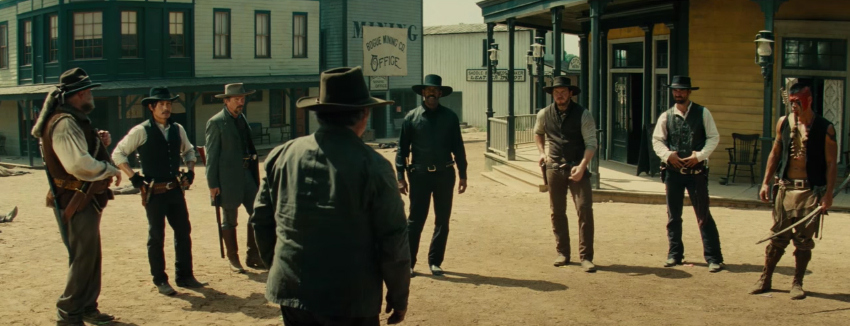Title: The Magnificent Seven | Rated: PG-13 | Runtime: 132 min | Theaters nationwide
The arrival of the fall season brings you another edition of the High-Low Report! Today, Andrew’s easy-to-please tendencies and Jun’s sophisticated palate go head to head over the recent western action flick, The Magnificent Seven, a remake of the 1960 film of the same name, which is itself a remake of Seven Samurai, Akira Kurosawa’s 1954 classic. In fact, Andrew and Jun have decided to tackle the other two films as well since they watched both recently, so you’re in for treat. Will they butt heads or will they harmoniously agree? WARNING: Spoilers ahead.
Andrew’s thoughts are in red, and Jun’s in blue.
As glad as I am that the western genre is alive and offers today’s audiences a couple of films every year, I do wonder if it’s for naught when among the fare is a bland movie like The Magnificent Seven. It’s not a terrible movie, but there’s honestly nothing memorable about it, and whatever interesting ideas it has go nowhere.
Props to director Antoine Fuqua for casting a fairly diverse group as the titular Seven, but to me, it doesn’t amount to much when most of them play characters who are flat and vapid. The biggest issue I have with this film is that I don’t emotionally invest in any of these characters, and their relationships hardly develop in meaningful ways. Goodnight Robicheaux (Ethan Hawke) having some form of PTSD is a compelling character trait, and seeing him wrestle with it is fascinating until it suddenly stops being a problem so he can kill people. Vasquez (Manuel Garcia-Rulfo) has some charisma, but he’s a one-note character, as is Billy Rocks (Lee Byung-hun) – an odd name to give to the only Asian role. Josh Faraday (Chris Pratt) is the same character at the end of the film as he was at the beginning. Sam Chisolm (Denzel Washington) is cool, but I think that’s what you get when Washington is playing him. Jack Horne (Vincent D’Onofrio) collected tons of Native American scalps back in the day, and that should be an issue for Red Harvest (Martin Sensmeier), a Comanche warrior, but it’s never brought up. Even the relationships between the gunslingers and the townspeople they protect are nonexistent, and the filmmakers go out of the way to emphasize how cartoonishly evil the villain, Bartholomew Bogue (Peter Sarsgaard), is.
Perhaps these issues stem from the way the plot is structured. This is definitely an action-oriented film, and Fuqua – along with screenwriters Nic Pizzolato and Richard Wenk – clearly wants to showcase such sequences. By the time the seven arrive at the town of Rose Creek, they have about a week to prepare for Bogue’s forces to arrive, which means that developing relationships between the characters takes a backseat to training scenes and Home Alone-style trap laying. When the action unfolds, there’s no denying its grandeur and violence, yet I was observing it more than I was being engaged by it, which comes down to the film’s lack of fleshed-out characters. I suppose the film can entertain you, but the only things charging it is the action and some humor.
I can’t help but be disappointed by this film. I think the cast certainly has the chops to really bring their characters to life (I wonder whether this was edited heavily), but the story doesn’t afford them many opportunities to do so. What did you think of the movie, low-brow?
I feel like it’s been too long since we’ve disagreed, and now’s the time for me to buck the “high-brow sensibility” path you’ve been leading me down and set up camp firmly on the other side of the spectrum: I really enjoyed it. There were flaws but I went in hoping for a kick-ass western and I left the theater entertained. I thought the action sequences were well shot and not only was the cast diverse, but so were their talents within the film. The final battle felt very Avengers-esque in that you saw each of their unique talents on display, but the scenes were driven to ping you from section to section of the battlefield. If there was something that was lacking, it was periodic flashes to show the scope of the battle. It didn’t quite feel as epic as it should have been. That’s why my favorite scene was when the Seven first rode into town. Chisolm’s face-off with McCann (Cam Gigandet) felt like a powder keg waiting to explode. Every line had a corresponding physical response and the dialogue felt like different steps of a Rube Goldberg machine, with the final payout being the first scene of the crew in action. I loved it.
As far as performances go, my favorite was probably Sarsgaard’s. He used a terrible balance of cruelty, brutality, and indifference to put together a villain that I immediately loathed. Even his final scene, begging for his life while reaching for his pistol, showed the despicable side to his ambition. There is no honor or decency hiding under that bored look – just an unwavering commitment to himself. Performances from the Seven were mostly solid across the board, with Washington and D’Onofrio being my favorites. Denzel is always a badass in action roles, and D’Onofrio does a great job playing a physically imposing but spiritually “subtle” character. He also provided legitimate comic relief to the occasion without yanking away from what you’re watching. Which brings me to Chris Pratt. Pratt has wonderful comedic timing. Pratt seems to be a likable guy. But Pratt needs to find a way to play something other than Star-Lord in action films. Whereas you could argue that every other member of the Seven took their parts and tried to become a part of the Old West culture, every time Pratt spoke, I felt like he had been dropped there by divine intervention. Yes, he’s funny. But he also felt out of place – and not in a compelling way.
Outside of that, I felt pretty good about the movie. I’m not willing to say it was a classic but I was going in expecting to be entertained. I guess if I were to look at this film it reminds me a bit of the Ocean’s 11 remake – an older film with a great ensemble cast that gets remade with lots of money and arguably an even more prolific ensemble cast. However, the O11 remake was driven by the dialogue and chemistry of its characters; this film felt driven by its action. I found it entertaining but definitely prefer the Ocean’s 11 remake to this film. The Magnificent Seven certainly left some bullets in the chamber but I wouldn’t go so far as to say it was a disappointment.
I am curious to hear your thoughts regarding how it related to its two predecessors. I watched this film treating it as a standalone product but once compared to it’s older “brothers,” the blemishes really start to show. Let’s start with the masterpiece first – what are your thoughts on Seven Samurai, and how do you think the two versions of The Magnificent Seven compare?
Ha! I knew that you’d end up liking this film. It looks like we generally agree over what the film got wrong more than what it did right.
To address your points regarding Pratt – I agree that he feels out of place, and I wonder whether it was the filmmakers or the actor himself who decided to channel Star-Lord here. In any case, his performance doesn’t ring true because the approach doesn’t fit the character that’s written. Star-Lord is Star-Lord by virtue of having other great characters for him to play off of, and there isn’t a single one for Faraday. Sure, there’s a bit of chemistry between him and Vasquez, but that only comes out in short bursts and doesn’t sustain over the course of an entire picture. You’d think that he would have a solid relationship with Sam or Emma Cullen (Emily Bennett), but he doesn’t share any memorable scenes with either of them. Also, Faraday isn’t particularly well-written, which doesn’t help matters.
Frankly put, this movie doesn’t hold a candle to both Seven Samurai and the original Magnificent Seven. I ended up revisiting those two after this one, and it just cannot stand on its own when you compare it to the others since – as you mentioned – its flaws become progressively apparent.
I love Seven Samurai. It’s been over eight years since I first saw it back in high school, and while I did think that it was a masterpiece at the time, rewatching it really reminded me why it’s such an incredible film. I like what you said when you wished that there were periodic flashes to show the scope of the battle in the Magnificent Seven remake. It’s about reminding us of the setting’s geography, and one thing that Kurosawa does so well in Seven Samurai is establishing the village. Sure, he takes well over an hour to do that, but he keeps the story moving without the need for an action sequence to take place. Speaking of which, there isn’t a single shot wasted in the film. There’s always something happening in every image, and Kurosawa is perhaps the master at composing movement within the shot. I also love the tone; it strikes the right balance between the drama and humor, which allows each of the characters to breathe. Because I care about the characters, I invest in every one of their relationships. Seven Samurai is a not just a perfect film; it’s a complete storytelling experience.
The original Magnificent Seven released six years after Kurosawa’s epic, and while it’s clearly a step down from its predecessor, I like it as a whole. There are parts of it that don’t completely work (like how the villagers initially head out to buy guns but end up returning with gunslingers, which the whole town apparently knows even though they shouldn’t), but I think the filmmakers did a solid job at streamlining Seven Samurai into a western. I like the seven with the exception of Chico (Horst Buchholz), and I dig the easygoing chemistry between Yul Brynner’s Chris Adams and Steve McQueen’s Vic. The characters have distinct personalities, and they pop whenever they’re on screen together. Plus, I appreciate how the film retains the growing relationships between the gunslingers and the villagers, even though I hate the three boys who pester Charles Bronson’s Bernardo O’Reilly. To top it all off, you have Elmer Bernstein’s iconic, playful score.
That said, the new Magnificent Seven compares negatively with the original in almost every way. Yes, my opinion of it is clouded by my love for Seven Samurai and my appreciation of the original Magnificent Seven, but even on its own, it doesn’t offer a fully realized story that takes advantage of whatever opportunities it has.
What are your thoughts about the original Magnificent Seven? Out of curiosity, did you ever see the sequels to it? There are apparently three in addition to a TV series. Also, what would you like to see in a sequel to this Magnificent Seven?
I really enjoyed the original Magnificent Seven. I can understand why you didn’t like Chico because when adapting from the original, they basically combined two separate characters (Toshiro Mifune’s Kikuchiyo and Isao Kimura’s Katsushirō – the brash, former farmer and the young, naive samurai respectively) and turned them into one hybrid character. Those two characters brought two distinct personalities and story arcs to Kurosawa’s film. Forcing them together created a character that felt… unfinished… unpolished? Unlike the love story in Seven Samurai, the love story in Mag Seven (1960) felt forced, and with all due respect to Rosenda Monteros (for whom I would absolutely give up a life of lead), Chico returning to the village was far less impactful than Shino’s (Keiko Tsushima) rejection of Katsushirō in Seven Samurai. Other liberties that director John Sturges took also felt hit or miss. For example, the decision to have the villagers betray the seven was a twist that I had forgotten and gave the film an opportunity to highlight the nobility of this particularly group of gunslingers. And, echoing your statement, the unnecessary addition of the three children that tail Bernado felt like an obvious way to try to create an emotional death and a message about the strength of the villagers. It rang hollow, and although I loved Bronson in the role, his inevitable demise felt like a placed piece of story in an inauthentic way. Calvera was also my least favorite of the three villains. I don’t think Eli Wallach played it poorly, but a true villain would not have let seven gunmen walk away at that point in the story – it just seems unlikely. However, I enjoyed the scripting and the chemistry between the Seven, and it makes me appreciate this year’s remake more. I thought Fuqua used iconic lines from the original in ways that felt true to both the original film while also integrating them seamlessly with his own story.
And that leads me a bit more to why, although I think the original is better than Fuqua’s version, there are reasons to enjoy this year’s release. The 1960 film was a solid movie but was a significant step down from Seven Samurai. As I watched Kurosawa’s work, it amazed me that although it was over three hours long, I never got bored. The story was compelling, the messages were weaved in with subtlety, and the action pieces pioneered the genre. One could argue that it’s a perfect film. Little things, like the tactical expertise Kambei shows in selecting seven as the minimum number of men needed to defend the village and the samurai’s angry response to the weapons and armor that the villagers have stolen from samurai they have killed, do a better job of conveying a larger message despite the fact that these moments are inherently less obvious than the ones we get in The Magnificent Seven. At the end of the day, it feels like a solid adaptation that would never reach the heights of the original. Fuqua’s film felt likes like a remake and more of reimagining of the original western. You might even argue that it has little reference to Seven Samurai, which works in its favor. Dramatic changes were made to the story that I do appreciate: no unnecessary love story, Washington having a revenge plotline, Bogue representing the idea of big money pushing around the little man – these are all changes that made this film something different from the 1960 movie and identified it as a standalone product. Combined with a diverse cast and really wonderful action scenes made it a really fun experience for me. Were there some missed opportunities? Yes. But to me, that seems less frustrating than failing to recreate the magic of Seven Samurai.
As far as sequels go, I have not seen any of the sequels to The Magnificent Seven. I think that Kurosawa’s film was meant to end the way it did and that he found the right moment of their lives for those characters to shine. The same can be said for the 1960 movie. As for this year’s film, I don’t think I’d be interested in a sequel. The characters that I most appreciated were all killed and, similarly to the originals, I don’t think there is anything moreto be learned from Chisolm. However, a prequel highlighting the origins of Chisolm and Goodnight’s relationship would certainly be intriguing to me. Additionally, I’m mildly interested in watching the anime based off of Kurosawa’s film, Samurai 7.
One thing I found interesting is that in each of the films, I had a different character that was my “favorite”. One might imagine that because there are characters that are loosely tied to each other in the three versions of the story that one would always like the same person. However, in the original, Gorōbei (Yoshio Inaba) was hands down my favorite as I thought he brought a fun and light-hearted sincerity to the group. I guess the equivalent to that role was probably McQueen’s run at Vic or Pratt’s Faraday, but they were nowhere near as interesting to me as Gorōbei. In the 1960 film, James Coburn’s turn at Britt was my favorite. I couldn’t tell you why except that I just thought both his performance and the character were very well done (Charles Bronson as Bernardo was a close second if not for the stupid storyline with the kids). But although I didn’t dislike Billy Rocks, he didn’t have the same charisma that Coburn’s Britt had. I thought Britt took the Kyūzō (Seiji Miyaguchi) character of Seven Samurai and gave him just a little more humanity. Kyūzō was far too stern and Japanese (I’m Japanese and I’m calling it out – he has the typical personality of the Japanese patriarchal figure) for my taste. As for my favorite in Fuqua’s film, it’s hard for me to decide between the badassery of Chisolm or charming weirdness of Jack Horne. Let’s call it a tie. I thought the villain was best under Sarsgaard and, despite my complaints about Calvera, feel they got better with each film. If there was a “flaw” in Kurosawa’s film, it’s that the leader of the bandits, while ruthless, felt relatively generic. However, with the story he was telling, I think that was the right decision. And if I had to pick between Kambei, Chris, and Chisolm to lead me to victory against hundreds of bandits… Kambei all the way. That man is a clever son of a bitch.
Alright buddy, what about you? Any highlights as far as characters from any of the films? Do you have any favorites? Any least favorites?
You know, in talking about all this, I just realized that A Bug’s Life is pretty similar to Seven Samurai and The Magnificent Seven, though I don’t think Pixar has ever officially acknowledged any influence by either. I wouldn’t count it as amongst them, though, solely because there is no “seven” in the title and there are more than seven warriors.
I’ve professed my love for Seven Samurai enough already, so it shouldn’t be surprising that my favorite characters across all three movies come from that one, especially since it’s the strongest in terms of character work. I really like all of the characters in that one, even if some are more developed compared to others such as Kyūzō and Shichirōji (Daisuke Katō). From that group, my favorite is probably Kikuchiyo because he’s so eccentric. His mood swings are just delightful, especially when he flips between fury and comically unhinged. Mifune does wonders with that role, and it’s my favorite performance of his from the films I’ve seen featuring him. Kambei and Kyūzō are two others that I like a lot, the former for his tactically brilliant mind and the latter for his nonchalant attitude. Though he isn’t in the film as much as I would have liked, Heihachi (Minoru Chiaki) definitely left an impression on me with his easygoing positivity. There honestly isn’t a single character from the film that I dislike, which is a testament to Kurosawa’s storytelling sensibilities.
As for the original Magnificent Seven, I’ve already mentioned which characters I dislike – Chico and the three village boys – and while none of them measure up to Kikuchiyo, I do like Bernardo, Britt, and Chris a great deal. I actually appreciate the lesson that Bernardo imparts to the kids (as useless as they are) regarding responsibility, and I would argue that not much separates Britt from Kyūzō. Admittedly, I reacted differently to Calvera than you did; he lets the Seven walk away because he doesn’t want to kill Americans and face retribution, which makes sense. The only dumb thing he did was stay in the village after forcing the gunslingers out and assume that they weren’t returning.
I wouldn’t go so far to say that I have favorite characters from this Magnificent Seven, but there are characters that I suppose I like. Washington (who can play a badass in his sleep) likely elevates the Sam that’s written on the page, and I could tell right from the get-go that this is a character that demands my attention. Vasquez is entertaining enough, as is Jack. If Goodnight actually had a fully realized arc, then he would probably be my favorite. Billy and Red Harvest (who, I’d like to add, has pretty much painted a Confederate flag on his face when we first meet him) are designed to show off their abilities more so than their seemingly nonexistent personalities, which is a shame. I find it funny how you really like Sarsgaard; I couldn’t take him seriously because Bogue is more of an exaggerated caricature than he is a character. I will add that I do like how the film generally handles Emma since she progressively becomes a leader and isn’t saddled with a new romantic relationship.
All in all, this Magnificent Seven remake is a slick and handsomely produced movie with some surprises (I predicted that Faraday would make it out alive, so I didn’t see his death coming), but lacks soul. Had Fuqua and his writers properly developed the characters and beefed up the relationships among the Seven as well as the townspeople, it would allow for the diverse cast to bounce off of each other and really let sparks fly. The conflict shouldn’t lie in just the shootouts; it should have its place among the protagonists too. Had the film seized such opportunities, I would have looked forward to a possible sequel.
Final thoughts and/or rebuttals, Andrew? I can totally imagine you shaking your head at me right now.
I think we feel relatively similarly about the two original films while disagreeing on this year’s remake. I can see where you feel that they left lots of opportunities on the table, but at the end of the day, I found it very entertaining. I don’t buy the Calvera argument and definitely think Bogue comes off as the most villainous. But let’s just say we agree to disagree – and all is right in the world.
I think that about sums up this particular run of the High-Low Report. Here are my ratings for all three movies – I’d bet we’re closer than we’d like to admit on some of these.
Andrew’s Ratings:
- Seven Samurai: 5.0/5.0
- The Magnificent Seven (1960): 4.25/5.0
- The Magnificent Seven (2016): 3.75/5.0
Jun’s Ratings:
- Seven Samurai: 5.0/5.0
- The Magnificent Seven (1960): 4.0/5.0
- The Magnificent Seven (2016): 2.5/5.0

